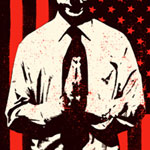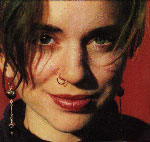By Jeff Nall

Bad Religion album cover for
“The Empire Strikes First” |
Freethinkers are always happy to discover a fellow open mind, engaged in free inquiry in an otherwise dogmatic society. But there is nothing quite as vindicating as those rare occasions when those in the limelight actually have the audacity to raise their voices and speak freely about their aversion to organized religion.
As a journalist, interviewing as many as one hundred musicians every year, I am always amazed at the number of artists who do just that. In a country where more than 70% of the people consider themselves Christian, the number of freethinking musicians seems to level the playing field. In fact, artists might be the freethought movement’s greatest ambassadors, simply because they are able to communicate freethought to the masses as few others can.
Take for instance Sean Danielsen, front-man for the band Smile Empty Soul (Lava Records)–a well-recognized band with a song on the Spiderman 2 soundtrack. In an interview I conducted earlier this year, Danielsen told me that his antipathy to religion would likely continue to surface on the band’s future albums, as it does on the current, self-titled album. “Religion is just such a big bad part of my life that it’s going to come out,” he said.
It’s easy to understand why religion has had such an effect on the artist. According to the bio on the band’s website, “[a]t the age of 7, (Danielsen’s) ‘very religious’ mother and stepfather took him to live in an abandoned summer camp in Maine,” where he was isolated for three years in what he described as “the middle of the forest.” Danielsen now freely espouses his displeasure with organized religion, and the effect it has on people like his parents.
“I’m definitely against all organized religion just because, when you really look at it, organized religion has caused most of the deaths in the history of this planet. Most of the wars were fought over organized religion. And if people would just give that shit up, it would solve a lot of problems in this world.”
Lyrically, the group’s current album, which has sold more than 350,000 copies, is laden with critiques of religion. Take for instance, “Every Sunday”: “I don’t want your religions/ And I don’t need your sympathy/ And I don’t want a part of all your hatred/ No matter how much you yell at me/ I still say/ You’re the ones that kill your babies/ You’re the ones that fuck your kids/ You’re the ones that throw each other away/ You’re the ones sitting in church every Sunday.”
One of the group’s music videos, “Nowhere Kids,” which was yanked off the air by MTV, takes on clergy sexual abuse. “It started with a scene of a perfect suburban family standing in front of their house,” explained Danielsen. “Their priest is there. The video is real dark. Later on in the video the dad pretty much beats the son, and the priest molests the little boy.”
Danielsen and his band, Smile Empty Soul, however, are anything but alone in their discontent with religion.
Veteran punk-metal rock band Boy Sets Fire (Wind-up Records) also tackles organized religion on their current album, “Tomorrow Come Today.” Songs like “Bathory’s Sainthood” attack blind dogmatism:
“Genuflect away the sins that we’ve known/ Sure one percent rules, but heaven’s made of gold/ Do we really want, do we really need a bastard messiah/ Wrapped up in the dream of patriotic clean white-washed desire/ And what gives us the right to feel with remorse for a god they created/ A god for the poor, for bathory we’re bleeding out the devil hides in angelic shrouds.”
Another song from the album, “Last Year’s Nest,” lambastes “wishful” thinking. “It’s just about hope and its ability to basically heal what’s going on in our country,” explained vocalist Nathan Gray. “If you’re hoping for something, you have to make it happen.”
One of the more profound and best known freethinking artists, Ani DiFranco, has recently released a beautiful album, Educated Guess, comprised of penetrating, often deeply rational lyricism. “Animal,” one of the better songs on the album, takes time to briefly step on the toes of Christianity: “Ask any eco-system/ Harm here is harm there/ And aggression begets aggression/ It’s a very simple lesson/ That long preceded any king of heaven.”
But DiFranco is anything but coy about her thoughts on hardcore bible-thumpers. In her poem “Literal,” featured in the CD booklet, she gracefully takes on religious literalists:
“When they said he could walk on water/ What it sounds like to me/ Is he could float like a butterfly/ And sting like a bee/ Literal people are scary, man/ Literal people scare me/ Out there trying to rid the world/ Of its poetry/ While getting it wrong fundamentally/ Down at the church of ‘look,/ It sez right here, see!’ “
Yet of all the freethinking popular artists currently making waves in the music industry, none compares to the kind of overt iconoclasm of Bad Religion.
After 20 years in the industry, 13 full-length releases, and more than two million records sold, Bad Religion is likely the bestselling, openly atheistic rock band in American history.
Renowned as one of the best punk bands ever, Bad Religion’s latest album, “The Empire Strikes First,” features the band’s most transparent ode to atheism, appropriately titled “Atheist Peace.” Although the song runs just three seconds shy of two minutes–remember this is punk rock, and bands like Bad Religion know how to make their point real fast–the lyrics, sung by Greg Graffin, are as brazenly poignant as the song is blazingly fast.
“Tell me what we’re fighting for/ No progress ever came from war/ Only a false sense of increase/ And the world won’t wait/ For the truth upon a plate/ But we’re ready now to feast on an atheist peace.”
Bass guitarist Jay Bentley told me that the song is Graffin’s way of showing how people without religion are often above the fray resulting from religious conflicts.
“I think that Greg’s concept of ‘Atheist Peace’ is basically just saying look, a lot of today’s problems are being sparked by religion; and that’s true in America and it’s true in the Middle East. There’s a lot of issues that are coming up because of religious ideology. And I think what Greg is saying is, look at me, I don’t have those problems. I don’t feel oppressed by another religion and I don’t feel like I have to defend my faith.”
Graffin, a self-avowed atheist, recently received his Ph.D. from Cornell University. Bentley says Graffin’s denunciation of religion stems from the studies he conducted for his thesis, which, according to Bentley, focus on “religion and its effect on the evolution of mankind.”
“He’s pretty much being straightforward about his feelings,” said Bentley. “He’s putting his heart on his sleeve and saying ‘here’s how I feel.’ “
Expressing himself fully, Graffin offers an even bolder diatribe, on traditional notions of God’s beneficence, in “God’s Love.”
“Tell me! Tell me; where is the love?/ In a careless creation/ When there’s no ‘above’/ There’s no justice/ Just a cause and a cure/ And a bounty of suffering/ It seems we all endure/ And what I’m frightened of/ Is that they call it ‘God’s love.’ “
Other songs like “The Quickening” and “Live Again–The Fall of Man” are replete with rational appeals for science and reason over faith.
When it comes to spreading the word of reason, most of us are probably inclined to give all the credit to academic intellectuals, scientists and philosophers. But we should also realize the vital role artists play in exposing the populous to the liberty of freethought. Artists have the ability to speak to people at a level of intimacy often not afforded to scholars. And bands like Smile Empty Soul and Bad Religion, and musicians like Ani DiFranco, prove that religion doesn’t have a monopoly on poetry and art. Freethinkers, liberated from religious dogma, are often the world’s best creators.
Jeff Nall is a Central Florida-based writer. He has written for various publications including: Z-Magazine, Clamor, Liberty, Freethought Today, Toward Freedom, Impact Press, and Utne (web-watch).
More About Ani DiFranco
September 23, 2004

On this date in 1970, punk folksinger Ani DiFranco was born in Buffalo, New York. Ani (pronounced AHH-nee) started singing Beatles’ songs in local bars as a youngster. By 15, she had begun writing her own material, and was living on her own. She graduated at age 16 from the Visual and Performing Arts High School in Buffalo and moved to New York City at 18. She has produced 13 albums. Sing Out calls her lyrics “jaw-dropping.” Spurning offers from indie and major labels alike, Ani started her own record company, Righteous Babe Records. Ani not only writes and publishes her own songs and produces her own recordings, but even creates the artwork. An in-demand artist, she tours acoustic, college and rock club circuits, winning over a diverse audience. Her freethought views are revealed in such songs as “Animal” (from Educated Guess), in which she sings about growing up “surrounded by willful ignorance” and “the religions of men.”
“I’m an atheist. . . . how unfortunate it is to assign responsibility to the higher up for justice amongst people.”
–Interview by Matthew Rothschild, The Progressive, May 2000
A sample of what you’re missing if you haven’t been reading the “Freethought of the Day.”
